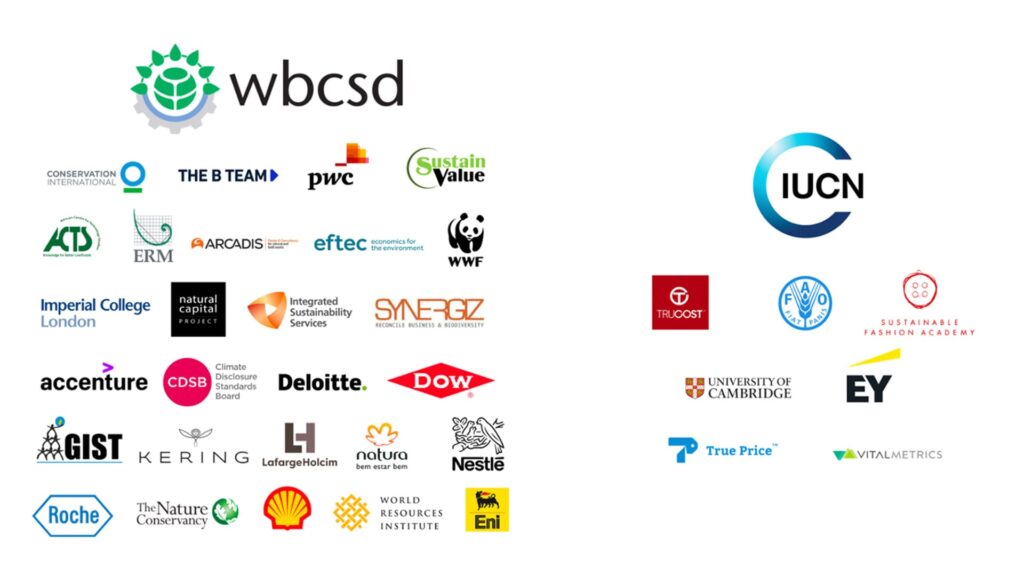The Natural Capital Protocol and Sector Guides are products of the Capitals Coalition. The Coalition is a global collaboration redefining value to transform decision making.
Two consortia led the development of the Natural Capital Protocol and the Apparel and Food & Beverage Sector Guides.

The WBCSD consortium led the development of the Natural Capital Protocol with Conservation International, The B Team, PwC and Sustain Value leading the technical development; ACTS, Arcadis, eftec, ERM, Imperial College, ISS, Natural Capital Project, Synergiz and WWF developed critical technical elements; and, Accenture, CDSB, Deloitte, Dow, eni, GIST Advisory, Kering, LafargeHolcim, Natura, Nestlé, Roche, Shell, The Nature Conservancy and World Resources Institute provided technical insights and review.
The IUCN consortium has also contributed to the development of the Natural Capital Protocol, developed the accompanying sector guides and managed the business engagement and pilot testing. Trucost led the development of the sector guides on Food and Beverage and Apparel, with technical support from Indicate Advisory Services, The Sustainable Fashion Academy and The Food and Agricultural Organisation of the United Nations. EY carried out the business engagement and University of Cambridge Institute for Sustainability Leadership (CISL) managed the pilot testing process. IUCN National Committee of the Netherlands, True Price and VitalMetrics provided technical insights and review.
Collaboration has been central throughout the Protocol development process, through scoping, writing, piloting and consultation.
Scoping
In order to produce the best possible output, build consensus and gain market momentum, the Coalition used every opportunity to engage with businesses including a Business Engagement Program.
Writing
The Protocol and sector guides have been developed through a collaborative process with many organizations contributing people, time experience and skills.
Piloting
The Coalition engaged over 50 businesses to pilot and review the Protocol, sharing experience with each other, and to feed back into the editing process.
Consultation
The public consultation gave stakeholders the opportunity to take part in the development. Over 3,000 responses were received from 143 organizations spanning 5 continents. Read the summary report.
Leveraging existing work
The Protocol builds on a number of approaches that already exist to help business measure and value natural capital; including the Corporate Ecosystem Services Review (WRI, WBCSD and the Meridian Institute), and the Guide to Corporate Ecosystem Valuation (WBCSD, IUCN, ERM, and PwC).
Following on from the Natural Capital Coalition’s publications Towards a Harmonised Protocol and Taking Stock, we actively sought submissions of publicly available and proprietary methodologies to be leveraged in the development of the Protocol.
A Methodology Review Panel objectively reviewed voluntary submissions of proprietary methodologies. Through applying a set of a priority criteria, the Panel recommended several proprietary methodologies be considered whilst we develop the Protocol.A list of all the publicly available methodologies received can be found here.
Steering Group
To guide the development of the Protocol a steering group was established. They met monthly to review progress and reported regularly to the Coalition board.
| Richard Fleck Chairman Consultant, Herbert Smith Freehills | Rosemary Bissett Head of Sustainability Governance & Risk, National Australia Bank | Helen Dunn Senior Economic Advisor, formerly UK DEFRA |
| Michelle Lapinski President, SustainBiz | Ivo Mulder Programme Officer, United Nations Environment Programme | Elizabeth White Chief Strategist Sustainability, IFC |
| Heather Wright Program Officer, Gordon and Betty Moore Foundation |
Development of the Natural Capital Protocol Project has been made possible with generous funding from Gordon and Betty Moore Foundation; IFC with the support of the Swiss State Secretariat for Economic Affairs (SECO) and the Ministry of Foreign Affairs of the Government of Netherlands; The Rockefeller Foundation; United Nations Environment Programme (UNEP); and UK Department for the Environment, Food and Rural Affairs (DEFRA). The Coalition is hosted by ICAEW.
